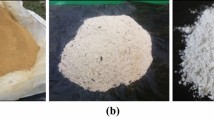Abstract
This research focuses on optimum usage of industrial waste in soil stabilization. Shear strength alteration happens in subsoil due to environmental fluctuations or seismic events that are generally observed in hilly areas with unsupported backfills. This problem becomes worst in the case of problematic soil that causes collapse or swelling followed by shrinkage in contact with water due to the high anisotropic nature of the subsoil. The cyclic behavior of various problematic soils under transient loading directly incorporates the economic loss and human lives. The present experimental work has briefly described the suitability of using rice husk ash (RHA) in soil stabilization and reducing the dumping of toxic waste responsible for environmental pollution. In place of common stabilizer units such as fly ash and pond ash, we use a cheap stabilizing agent which has no use in soil improvement in past as single unit. RHA is used as a chemical stabilizer as it contains high percentage of silica. If the soil has a larger fraction of clay mineral, then RHA (produced by controlled incineration ~400–500 °C) mixed soil in different proportion (4 and 6% by weight of soil sample) performed differently in serviceability and workability tests on soil sample like UCS, modified proctor test, CBR, Atterberg’s limit, permeability, consolidation test, etc. Excellent results were obtained at 6% optimum dosage of RHA in locally available laterite soil (inside NIT Agartala campus) from NE part of India.
Access this chapter
Tax calculation will be finalised at checkout
Purchases are for personal use only
Similar content being viewed by others
References
AASTHO (2011) https://www.academia.edu/31863807/AASHTO_2011_pdf
Ahmed B, Rahman A, Das J (2015) Improvement of subgrade CBR value by using Bagasse ash and Eggshell powder. Int J Adv Struct Geotech Eng 4(2):86–91
Alhassan M, Alhaji MM (2017) Utilisation of rice husk ash for improvement of deficient soils in Nigeria: a review. Niger J Technol 36(2):386–394
Andavan S, Pagadala VK (2020) A study on soil stabilization by addition of fly ash and lime. Mater Today: Proc 22:1125–1129
Gupta G, Sood H, Gupta P (2020) Performance evaluation of pavement geomaterials stabilized with pond ash and brick kiln dust using advanced cyclic triaxial testing. Materials 13(3):553
Jamsawang P, Yoobanpot N, Thanasisathit N, Voottipruex P, Jongpradist P (2016) Three-dimensional numerical analysis of a DCM column-supported highway embankment. Comput Geotech 72:42–56
Jongpradist P, Homtragoon W, Sukkarak R, Kongkitkul W, Jamsawang P (2018) Efficiency of rice husk ash as cementitious material in high-strength cement-admixed clay. Adv Civ Eng 2018
Jiang X, Huang Z, Ma F, Luo X (2019) Analysis of strength development and soil-water characteristics of rice husk ash-lime stabilized soft soil. Materials 12(23):3873
Jha AK, Sivapullaiah PV (2020) Lime stabilization of soil: a physico-chemical and micro-mechanistic perspective. Indian Geotech J 50(3):339–347
Karatai TR, Kaluli JW, Kabubo C, Thiong’o G (2017) Soil stabilization using rice husk ash and natural lime as an alternative to cutting and filling in road construction. J Constr Eng Manag 143(5):04016127
Khan AN, Ansari Y, Mahvi S, Junaid M, Iqbal K (2020) Different soil stabilization techniques
Lu N, Wayllace A, Oh S (2013) Infiltration-induced seasonally reactivated instability of a highway embankment near the Eisenhower Tunnel, Colorado, USA. Eng Geol 162:22–32
Liu Y, Chang CW, Namdar A, She Y, Lin CH, Yuan X, Yang Q (2019) Stabilization of expansive soil using cementing material from rice husk ash and calcium carbide residue. Constr Build Mater 221:1–11
NECRP (2017) https://employee.gsi.gov.in/cs/groups/public/documents/document/b3zp/mtyx/~edisp/dcport1gsigovi161649.pdf
Author information
Authors and Affiliations
Corresponding author
Editor information
Editors and Affiliations
Rights and permissions
Copyright information
© 2023 The Author(s), under exclusive license to Springer Nature Singapore Pte Ltd.
About this paper
Cite this paper
Paul, S., Sarkar, D. (2023). Chemically Stabilized Laterite Soil Using Rice Husk Ash. In: Anjaneyulu, M.V.L.R., Harikrishna, M., Arkatkar, S.S., Veeraragavan, A. (eds) Recent Advances in Transportation Systems Engineering and Management. Lecture Notes in Civil Engineering, vol 261. Springer, Singapore. https://doi.org/10.1007/978-981-19-2273-2_29
Download citation
DOI: https://doi.org/10.1007/978-981-19-2273-2_29
Published:
Publisher Name: Springer, Singapore
Print ISBN: 978-981-19-2272-5
Online ISBN: 978-981-19-2273-2
eBook Packages: EngineeringEngineering (R0)




